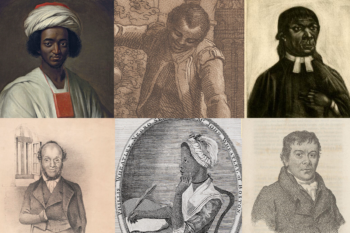
For the first lecture in its Humanist Heritage series, Humanists UK hosted writer, educator, and historian S.I. Martin for a lecture on ‘The Beliefs of Black Georgians’, introducing the life and works of a host of remarkable – but often overlooked – figures. Given the strength and influence of Christianity in Britain during ‘the long 18th century’ (1688-1815), Martin explored the ways in which people of the African diaspora were influenced by, and influenced, religious ideas – in Britain, including in challenging Biblical arguments and Church sanctioning of slavery, and making use of religious networks to promote social status while arguing for radical societal change.
S.I. Martin has worked for decades to bring diverse histories to wider audiences, including with the creation of the ‘500 Years of Black London’ walks, shining a light on the black historical presence on the capital’s streets. As Martin emphasised during the talk, there was a significant black population in Britain during the 18th century, across all classes of society, and with a complex relationship to religion. For some, embracing the language of Christianity helped them to ‘prove’ their moral character, to demonstrate their commonality with the white population, and to argue for the abolition of slavery and for their own human rights. For others, whose presence can be seen in baptism records across the British Isles, joining a church had other practical benefits, including enhancing their social status and enabling access to parish support. As is so often the case when seeking to understand people from the past, the real beliefs and attitudes of ordinary people can be difficult to decipher from surviving records.
Among those mentioned in last night’s talk were writers and abolitionists Ignatius Sancho, Ottobah Cugoano, and Olaudah Equiano, preacher John Marrant, poet Phillis Wheatley, and political radical Robert Wedderburn – who was imprisoned for blasphemy following a fervent defence of the right to free inquiry. While some of these, notably Olaudah Equiano and John Marrant, were forthright in their embrace of Christianity, S.I. Martin noted the acts of ‘small revolution’, perhaps even heresy, involved in creating a black religious vision, and using Bible stories to illustrate and support their own struggles for emancipation and fair treatment under the law. After all, as Martin pointed out, when so many passages of the Bible explicitly endorse the enslavement of others, to make use of it to argue for abolition could be seen as a radical act. Martin also noted examples of the ways in which apparent expressions of piety and self-deprecation could be read quite differently. One notable example being Phillis Wheatley’s well-known call to: ‘Remember, Christians, Negroes, black as Cain / May be refin’d, and join th’ angelic train.’ These concluding lines from Wheatley’s 1768 poem On Being Brought from Africa to America can be read as a pointed rebuke to those Christians who endorsed, or ignored, the mistreatment of Africans and the horrors of the slave trade.
Responding to questions from the audience, Martin noted the ongoing influence of Black Britons in many of the freethinking and radical movements beyond the Georgian period, from leading Chartist William Cuffay, to the organisers of the first Pan-African Congress in London in 1900. Later still, the First Universal Races Congress – the brainchild of leaders of the early humanist movement – would bring African-American freethinkers, most notably the humanist W.E.B. Du Bois, to the nation’s capital for the world’s first antiracist congress. Du Bois wrote:
Other world congresses there have been, and they have not dared to attack this problem openly and honestly. The Church has repeatedly dodged and temporized with race prejudice. The State has openly used it for conquest, murder and oppression… Here at last is a full fair frontal attack on the nastiest modern survival of ancient barbarism. It was a great day for humanity.
The Humanist Heritage project has been rooted in unearthing the forgotten histories of humanism and humanists in the UK, and this talk from S.I. Martin offered fascinating insights into people too often omitted from the historical narrative.
Humanists UK’s next talk in the Humanist Heritage series will be April’s ‘Uncontrollable Women’ with author Nan Sloane, introducing more of the freethinking radicals, reformers, and revolutionaries who have paved the way for those humanist activists who came after them.
Notes
For further comment or information, media should contact Humanist Heritage Coordinator Madeleine Goodall at madeleine@humanists.uk.
Explore the history of the humanist movement in detail on the Humanist Heritage website.
Humanists UK is the national charity working on behalf of non-religious people. Powered by 100,000 members and supporters, we advance free thinking and promote humanism to create a tolerant society where rational thinking and kindness prevail. We provide ceremonies, pastoral care, education, and support services benefitting over a million people every year and our campaigns advance humanist thinking on ethical issues, human rights, and equal treatment for all.
